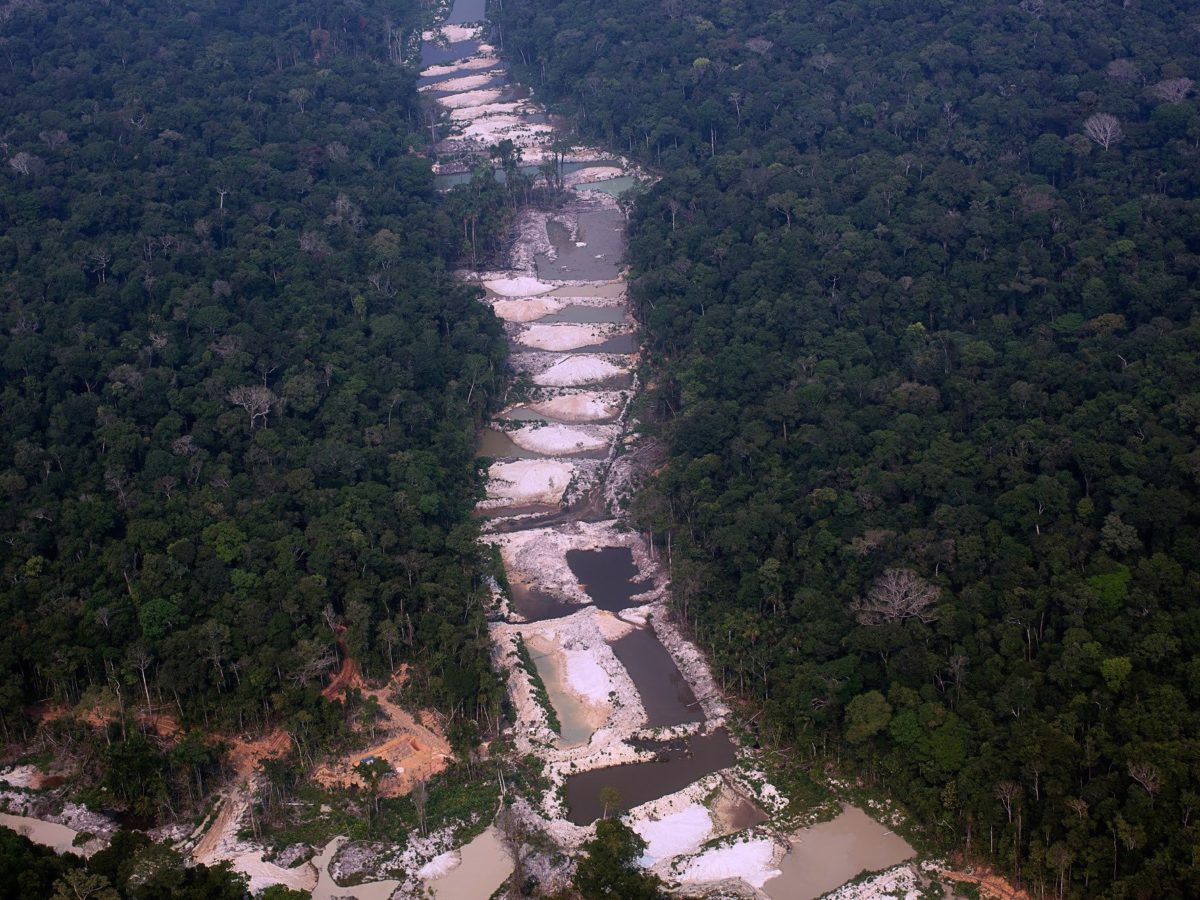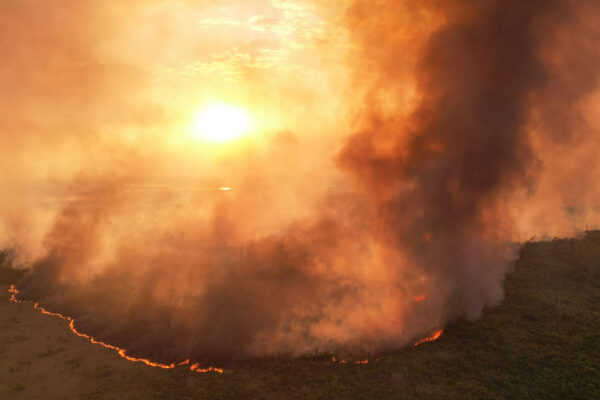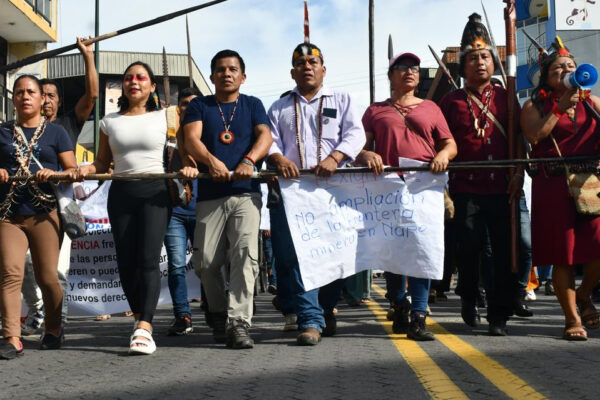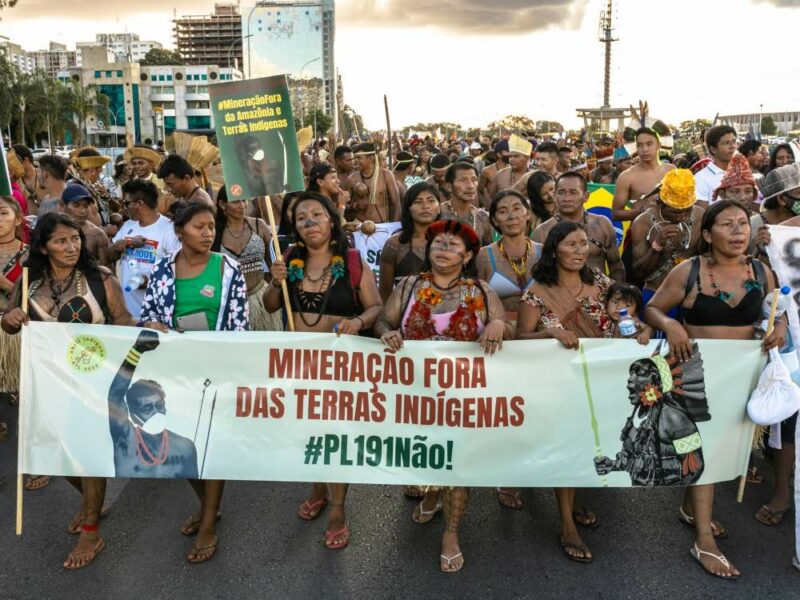On March 9, 2022, while more than 15,000 Brazilians demonstrated in front of Brazil’s Congress calling for the withdrawal of the “destruction package” – a series of bills and decrees that threaten environmental rights – Deputy Chamber President Arthur Lira decided to fast-track one of those bills during a late-night session. Bill 191/2020 would allow mining inside Indigenous lands, unleashing death and devastation upon the environment and Indigenous communities.
In our recent report Complicity in Destruction IV, we underscored the inherent risks related to Bill 191/2020, an egregious policy that represents the vision and interests of President Bolsonaro’s political appointees and the financiers of his campaign. In addition to allowing mining on Indigenous lands and denying Indigenous peoples their veto power, the bill also seeks to authorize the planting of genetically modified seeds and the building of hydroelectric plants, ranching activities, and oil and gas projects in these locations. Mining on Indigenous Lands is currently prohibited in Brazil. The country’s Constitution has imposed highly restrictive standards on mining activities when potentially conducted on Indigenous Lands, given the inherently high-impact nature of mining. Bill 191/2020 is yet another attack on Indigenous rights and territories.
Now, the bill has been rushed through the Lower Chamber – composed mostly of representatives of the agribusiness, mining, and extractive sectors – whose members voted 279 to 180 in favor of the “urgency” of the matter. The bill will likely be sent directly for a vote at the Deputy Chambers Plenary, skipping a number of procedural steps that this type of legislation usually follows, including a broad public discussion. The vote is expected to happen next month. If approved in the Lower Chamber, the bill would then go to the full Senate.
We at Amazon Watch, along with our partners at APIB, have launched our latest report as a tool to defeat Bill 191/2020 and any other attempts to roll back Indigenous peoples’ rights to their lands and self-determination. Vale, Anglo American, Belo Sun, Potássio do Brasil, Mineração Taboca/Mamoré Mineração e Metalurgia (both Minsur Group companies), Glencore, AngloGold Ashanti, and Rio Tinto are the mining companies highlighted in the report. These mining companies received a total of $54.1 billion in financing from investment managers and banks from the U.S. as well as France, Germany, Canada, Japan, and others. Together with APIB, we exposed their activities and are pushing them to make concrete commitments to protect these territories.
We must all ring the alarm and halt advancements into the Amazon by mining companies and their complicit financiers. Mining destroys the land, poisons the water and everything that depends on it, and devastates surrounding communities. It imposes huge costs on all, only to generate profits concentrated in a few hands. At this time of climate crisis, where large mining companies are positioning themselves as central players in the production of renewable energy, we must recognize the impacts of this unbridled extractivism, especially on Indigenous land.
Additionally, this mining bill contradicts the Brazilian Constitution and the internationally-recognized right to self-determination of Indigenous peoples guaranteed by Convention 169 of the ILO, by slashing the Indigenous right to Free, Prior, and Informed Consent (FPIC). It removes any opportunity for Indigenous people to veto activities on their lands. If approved, the bill will lead to an increase in deforestation, invasions of Indigenous lands, and violence against these peoples.
After very little movement in Congress last year, the bill has since been prioritized when the government included it in a list of legislative priorities for 2022. In early March, Bolsonaro stated that a possible fertilizer shortage caused by Russia’s war on Ukraine could be remedied if Indigenous lands were opened for the exploration of minerals such as potash, or potassium, a key fertilizer ingredient. Bolsonaro and his allies claim that these lands must be opened to mineral extraction to fuel Brazil’s powerful agribusiness sector and lessen the country’s dependence on fertilizer imports. This is a pretense. While Bolsonaro claims fertilizer scarcity warrants his government’s aggressive push to promote domestic production, most of the Amazon’s main potash mines are located outside Indigenous lands, and previous analyses show that all of Brazil’s demand for potassium could be satisfied by reserves located primarily outside the Amazon, completely outside of Indigenous lands.
Indigenous peoples have repeatedly mobilized to oppose Bill 191/2020, and polls show that 86% of Brazil’s public is against mining on Indigenous lands. The Munduruku refer to it as “the project of death that is dividing our people and bringing violence [against those who] fight to defend our land.” APIB has denounced the project as representing “manifestations of hate and visceral racism that the Bolsonaro administration has shown, routinely and publicly, against Brazilian Indigenous peoples, organizations, and leaders since its first day.” Considered an attempt at “manipulation of our desire for autonomy,” the bill was labeled by APIB as a “project of death.”
The federal government, politicians, and private sector actors insist that the passage of Bill 191/2020 would result in economic development for Brazil and for the Amazon region and its people. Yet a study in the scientific journal One Earth shows the explosive impact of Bill 191 on deforestation: The policy could result in a loss of over 160,000 km2 of forests, an area larger than England. Additionally, its passage could lead to $5 billion in annual losses in ecosystem “services,” defined as benefits that people obtain from ecosystems, meaning the Amazon’s critical production of food and raw materials for the peoples who live there, its ability to capture greenhouse gases, and regulate the global climate would be compromised further.
Among our recommendations, we are asking mining giants and their financial backers to publicly oppose Bill 191/2020. While many companies replied with attempts to challenge our data or discredit our research, none responded to our demands or positioned themselves clearly against this attack on Indigenous peoples’ rights. This shows that despite huge investments in ESG (Environmental, Social, and Governance) statements and publicity, these companies are far from taking concrete action to guarantee the future of the planet. This is why we need to keep pushing them and are inviting our supporters to sign the pledge to join us in sending a message to mining companies and financial investors: Keep mining out of the Amazon and off Indigenous lands!













